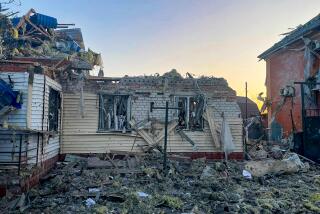Putin: Kremlin heeding Crimea leader’s call for help
- Share via
MOSCOW -- The newly installed pro-Russian leader of Ukraine’s rebellious Crimea region appealed Saturday for the Kremlin’s help in restoring “peace and calm,” and Russian President Vladimir Putin responded that Moscow will not ignore the request.
[Updated 6:58 a.m. PST March 1: Putin asked the Russian parliament for permission to send “a limited armed force to Crimea to ensure security of the Russian Black Sea Fleet and Russian citizens staying there,” the chairwoman of the Federation Council, Valentina Matvienko, told the Interfax news agency.
The Crimean republic’s prime minister, Sergei Aksenov, conceded in a televised address from Simferopol that Russian forces were already helping to secure strategic assets in the region, prompting acting Ukrainian President Oleksandr Turchynov to accuse Russia of “naked aggression.”]
It was unclear what kind of help Aksenov was requesting or what Putin might be willing to do to secure the strategic peninsula where Russia bases its Black Sea naval fleet on territory leased from Ukraine.
Aksenov emerged as leader of the so-called autonomous republic of Crimea on Thursday at a legislative session in Simferopol conducted while the assembly building was occupied by heavily armed and masked Russian gunmen. On Saturday, he declared himself to be commander of all armed forces and police in the region, in a direct challenge of the authority of new government leaders in Kiev, Ukraine’s capital.
The collaborative two-step between Moscow and Simferopol, Crimea’s regional capital, followed ominous military moves over the past two days. Masked gunmen in military fatigues took over the regional government buildings Thursday, and Russian military forces were reported to have arrived by the hundreds Friday to the Gvardeyskoye military airstrip near Simferopol.
Reporters in the area said armored personnel carriers were patrolling roads near the Russian base at Sevastopol, and video of at least a dozen Russian helicopters buzzing the Crimean territory was posted on YouTube.
President Barack Obama late Friday warned Putin that he was “deeply concerned” by the maneuvers, which are considered by the West to be in violation of Russia’s post-Soviet agreement with Ukraine for maintaining its naval base and support operations in Crimea. Obama said there would be “consequences” for the Kremlin should it interfere in Ukraine’s tense political standoff with Crimea.
Russia’s ambassador to the United Nations, Vitaly Churkin, told a press conference in New York that the Russian military movements were in keeping with Moscow’s diplomatic accords with Ukraine for its military presence in Crimea.
Aksenov, sporting a graying buzz cut and a quad-zip black sweater, read his statement of appeal for Russian security assistance on Rossiya-24 television and other government-controlled broadcasts.
“According to my responsibility for the life and security of citizens, I appeal to the president of Russia, Vladimir Putin, for assistance in guaranteeing peace and calm on the territory of the autonomous republic of Crimea,” Aksenov read calmly from a written text, referring to recent “disorder with the use of firearms.”
A response by the Kremlin quickly followed, the Russian media reported.
“Russia will not leave this request without attention,” said the statement from Putin’s office.
The Kremlin statement was the first by Putin’s office to acknowledge the power plays under way in Crimea. The Russian president has maintained plausible deniability in Crimea’s rejection of rule from Kiev by ignoring the accusations of Russian “invasion and occupation” lodged by opposition politicians now running the Ukrainian government.
Ukraine ex-President Viktor Yanukovich, who fled Kiev on Feb. 21 after signing a European Union-brokered agreement to end the deadly climax of a three-month rebellion against him, has taken refuge in Russia but insisted at a press conference Friday that he remains the legitimate ruler of Ukraine.
Ukraine’s worst unrest since the 1991 collapse of the Soviet Union was sparked by Yanukovich’s decision to scrap an association deal with the European Union in favor of maintaining closer political and economic ties with Russia.
While Ukrainians in the west and central areas of the country have celebrated the Kiev government takeover by the victorious demonstrators, eastern and southern areas of Ukraine, where the ethnic Russian minority and Russian-speaking communities are concentrated, are fearful of the new leaders’ stated intent to steer Ukraine away from Russian domination into a closer relationship with the West.
Crimea, where the majority of its 2 million residents are Russians or Russian speakers, has been particularly resistant to the change in national leadership, although Ukrainians and Crimean Tatars have welcomed the new Kiev regime. The ethnic split opened a window for Moscow to assert its authority in the region ruled by the Kremlin for centuries before the area was ceded to Soviet Ukraine in 1954.
Twitter: @cjwilliamslat
Times staff writer Sergei L. Loiko in Kiev contributed to this report.
More to Read
Sign up for Essential California
The most important California stories and recommendations in your inbox every morning.
You may occasionally receive promotional content from the Los Angeles Times.











